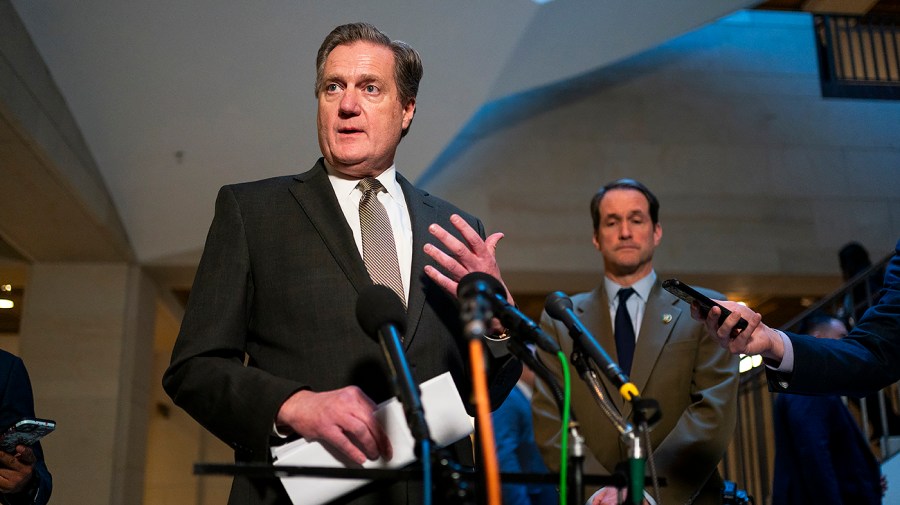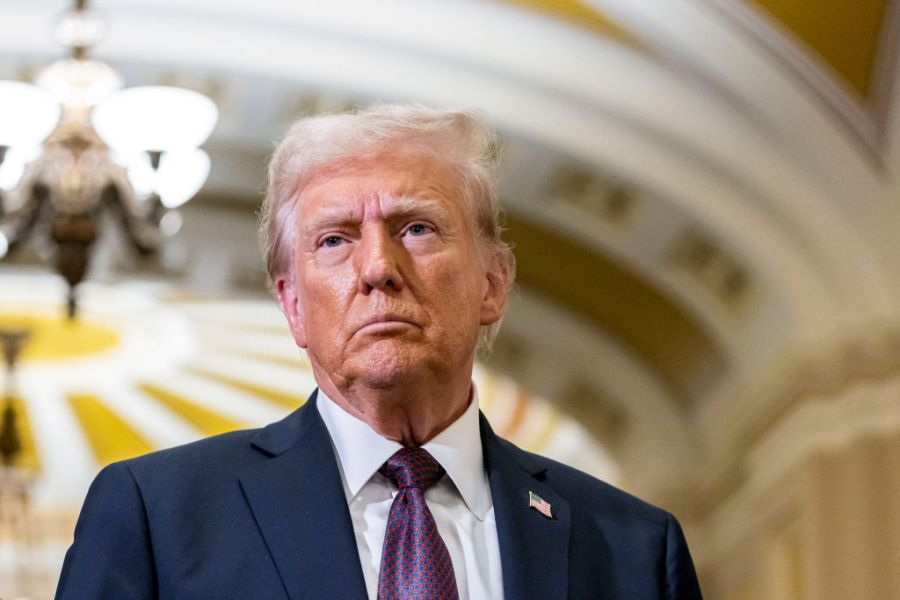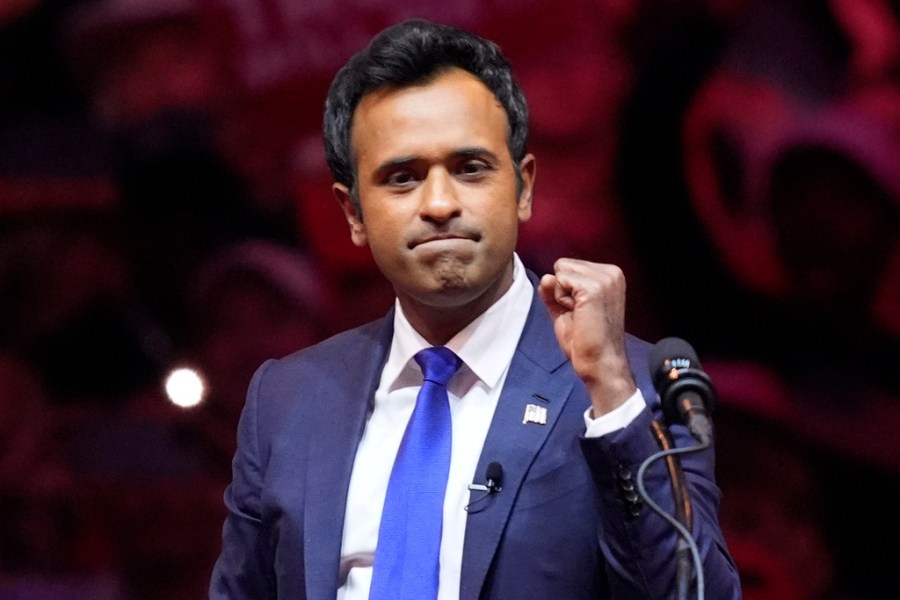
Johnson’s Intel Committee shake-up fuels worries about panel under Trump
Speaker Mike Johnson’s (R-La.) decision to shake up leadership on the House Intelligence Committee sent shockwaves throughout the panel and beyond, fueling concerns on both sides of the aisle about the influence of the MAGA-right and how sensitive national security matters will be handled in the looming Trump era.
Johnson declined to reappoint Rep. Mike Turner (R-Ohio) — a defense hawk and more traditional national security-focused holdover from former Speaker Kevin McCarthy’s (R-Calif.) time leading the House GOP — to the chairmanship of the high-profile committee. Instead, the Speaker opted to install Rep. Rick Crawford (R-Ark.), the most-senior GOP member of the panel who has been more skeptical of Ukraine aid, to the top job.
The change, which Johnson solidified Thursday, is setting a Trumpier tone at the top of the plum committee.
While Turner is an ardent supporter of Ukraine, Crawford voted against a multibillion-dollar aid package for Kyiv last year. Crawford, in a statement announcing his new chairmanship, raised concern that “abuse within our nation’s security apparatus has eroded trust in our institutions.” And while Turner voted to certify the 2020 election, Crawford objected to certifying electors from both Pennsylvania and Arizona.
The unexpected nature of the roster shift is sparking questions among members of the panel about approach the committee will take moving forward — and targeting some ire at Johnson.
“It kind of came out of nowhere. No good explanation,” Rep. Dan Crenshaw (R-Texas) said of Turner’s removal. “Lot of experience and expertise gone with Mike Turner. Not obvious what Johnson has in mind for the future, so we all have questions and concerns.”
“There’s been too much disruption on one of the most important committees in Congress,” Crenshaw said, adding, “It’s all happened under Johnson’s leadership.”
Rep. Joaquin Castro (D-Texas), another member of the panel, pointed to President-elect Trump’s apparent influence on the decision. One GOP lawmaker told The Hill that “Mar-a-Lago vetoed Turner.”
“It’s a disturbing trend of a kind of purge of anybody who isn’t a lackey for Donald Trump,” Castro said.
Johnson and a Trump spokesperson, for their part, have denied that the president-elect directed the Speaker to remove Turner from the panel, with the Speaker underscoring that he made the decision of his own volition. Johnson, as Speaker, has the unilateral power to appoint the panel chair and members.
“This is not a Mar-a-Lago or a Trump decision. This is a Speaker’s decision. A lot of deliberative thought goes into these things. The Intel Committee is extremely important, especially at a time like this, and it’s time for a new start,” Johnson said in response to a question from The Hill, citing “abuses” within the intelligence community.
“We’ve got to clean all that up, and it’s going to be a time for reform and all that,” he added.
That response, however, has not stopped members on both sides of the aisle from worrying about the president-elect’s influence moving forward.
“I don’t think he showed enough fealty to President Trump,” committee member Rep. Chrissy Houlahan (D-Pa.) said of Turner’s ouster. “It’s really, really concerning, and President Trump hasn’t even been sworn in yet. And these kinds of changes, huge sea changes, are happening. Speaker Johnson, in my opinion, just usurped a bunch of his power — Article I power — as near as I can tell at the request-slash-requirement of President Trump.”
Rep. Jason Crow (D-Colo.) said he thought any Trump involvement was motivated by his own run-ins with the law enforcement and intelligence community.
“What’s pretty clear to me is that Donald Trump has taken a personal interest in the nominees for national security and federal law enforcement positions; I think a lot of that has to do with his perceived grievances and his interest in putting loyalists into these positions,” he said. “Which I’ve repeatedly said is troubling for our national security. When you talk about these positions, they should be bipartisan. They should be nonpartisan and above politics, because that’s what our national security requires.”
Turner’s ouster came as members on both sides of the aisle said they felt like the Intelligence Committee had finally reached a good place. They note it has transitioned from the fraught years of the Trump impeachment and feuding between former chairs Devin Nunes (R-Calif.) and Adam Schiff (D-Calif.), who used the panel as a forum to battle over the investigation into Russia’s influence on Trump’s 2016 campaign, to return to the more bipartisan manner the committee had seen for years.
McCarthy had appointed Turner as part of an effort to turn a new leaf, and he’s had a good relationship with ranking member Jim Himes (D-Conn.), as well as with members further down the dais.
With Turner out, members of the panel are worried about the committee’s next chapter.
“Mike Turner, I think, tried to work in a bipartisan way for the best interest in the country, and it was a change from Devin Nunes, and so I’m concerned [about] what’s coming,” Castro said before Johnson announced Crawford as the new chair.
Rep. Raja Krishnamoorthi (D-Ill.), another member of the committee, said he was concerned Turner was “being punished for practicing bipartisanship.”
“One, Donald Trump appears to have some kind of veto power over the appointment of members of Congress to different committees, which is disturbing in and of itself. And then secondly, you know, he obviously had a problem with Mike’s trying to bring more bipartisanship to the committee. And there’s nothing more urgent than having more bipartisanship in Congress, and certainly on issues of national security,” he said.
To Democrats, Turner’s removal is just the latest in a series of concerning moves on national security from the MAGA wing, particularly as Trump has pledged to go after the “deep state.”
Krishnamoorthi pointed to Trump’s nominations of Tulsi Gabbard to be director of national intelligence and Kash Patel to be FBI director. And Johnson’s appointment to the Intelligence panel of Rep. Ronny Jackson (R-Texas), Trump’s former White House physician, and Rep. Scott Perry (R-Pa.), whose cell phone was seized by the FBI in 2022, raised eyebrows in both parties.
House Minority Leader Hakeem Jeffries (D-N.Y.) touted Turner’s “impactful” track record as Intelligence Committee chief, calling Johnson’s decision “shameful.”
“Mike Turner has robustly promoted the safety of the American people and the Free World and his unjustified ouster is likely being applauded by our adversaries in Russia and China,” he added.
There may have been other factors contributing to Turner’s ouster. He had rankled some with a cryptic announcement about an urgent national security member, prompting declassification of Russia’s nuclear ambitions in space — a move one GOP lawmaker said Johnson’s office saw as a mess they had to clean up.
Another element fueling inter-GOP strife is the battle over how to handle reform of Section 702 of the Foreign Intelligence Surveillance Act (FISA), a controversial law that allows the government to spy on foreigners when they are located abroad.
It’s been a target of MAGA-aligned members and privacy hawks who see it as a backdoor for collecting information on Americans and want to add a warrant provision to the law.
From his perch, Turner led the charge to renew FISA 702 without the warrant amendment, a battle he narrowly won last April. Some say that victory fueled hard-line conservative ire toward the now-former chair.
“[House Freedom Caucus] seems to care about one thing and one thing only, which is FISA,” Crenshaw said.
Crenshaw also said that a Turner deputy was recently blocked from going to the National Security Council as a part of the fallout. But he said complaints about FISA 702 would likely hit a brick wall with many other new intel nominees backing the provision.
“If there are people trying to cut some of these rational national defense types out, it’s not going to work. We’re going to win, and all you’re doing is creating bad blood in the process,” Crenshaw said.
Crawford has also been a supporter of FISA 702, but in a statement Thursday, he referenced the kind of concerns espoused by Freedom Caucus members about the law. It will be up to him to shepherd the law through its next reauthorization before it expires in 2026.
“Without aggressive oversight and vigorous protection of Americans’ Fourth Amendment rights, the IC is prone to give in to mission creep and skirt U.S. laws,” Crawford said. “In all our work, I pledge to preserve Americans’ constitutional rights even as we work to support the IC in doing everything required to collect indispensable information from our foreign adversaries.”
For those still on the committee, questions remain about their working dynamic going forward.
“The committee can adapt. I mean, we’re — we all work well together. But it definitely will be a disruption with Turner, because Turner did a lot of good things and kind of refocused the committee back to the way it should be,” said one GOP committee member who requested anonymity.
But Democrats said they will be vigilant going forward in battling any efforts by Trump to shift the committee.
“I’ll do everything in my power to prevent it from being pulled into politics or pulled into Donald Trump’s loyalty tests,” Crow said.



